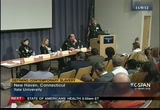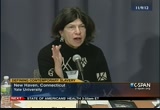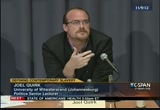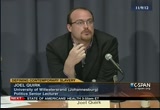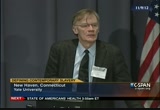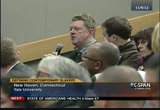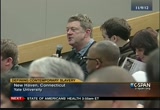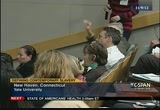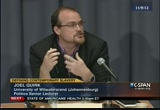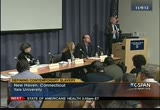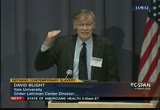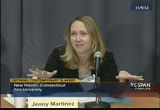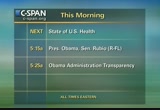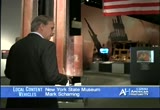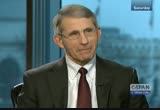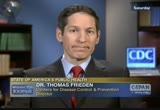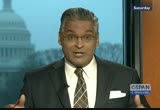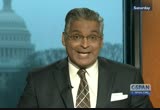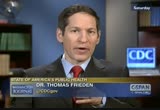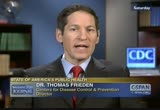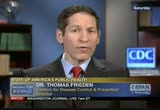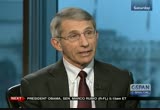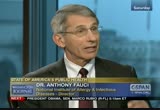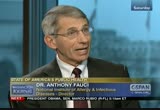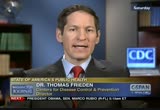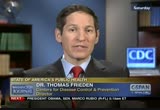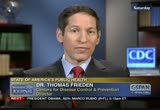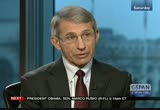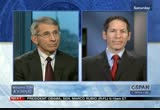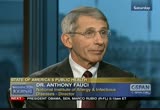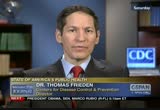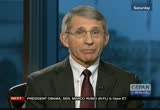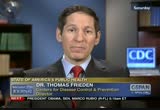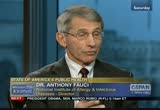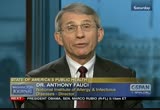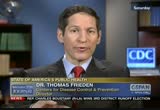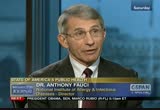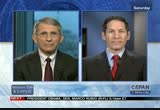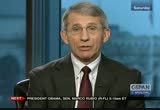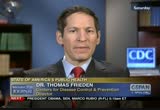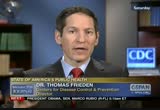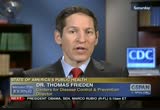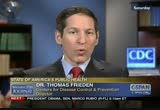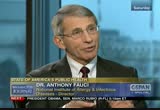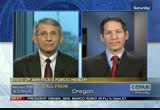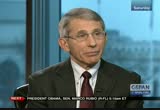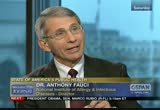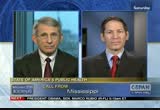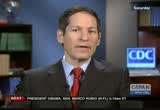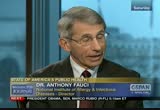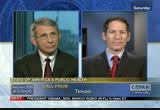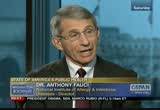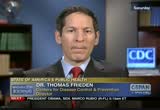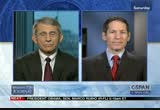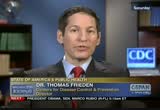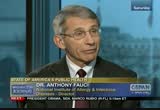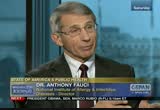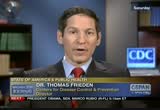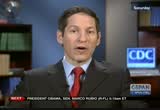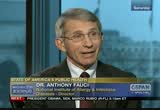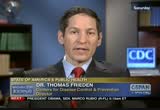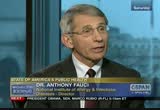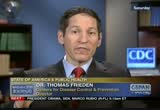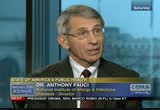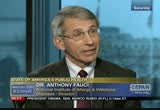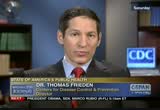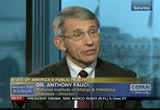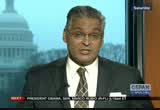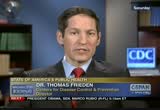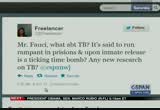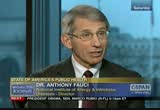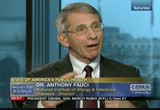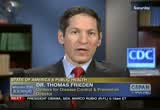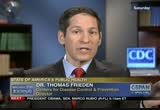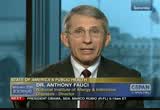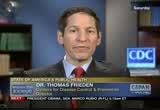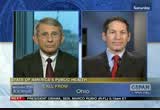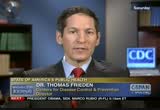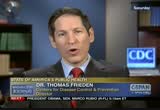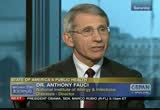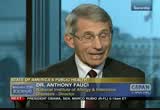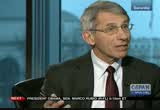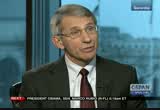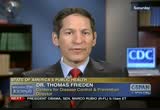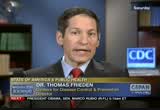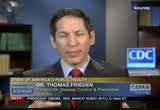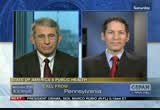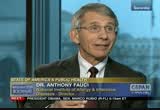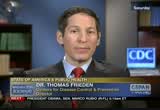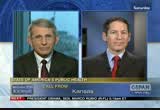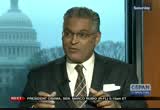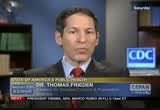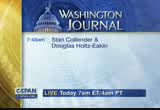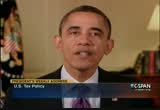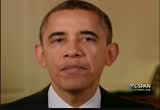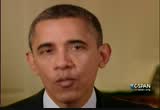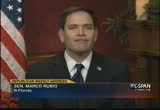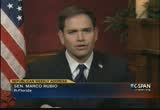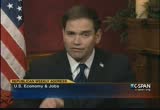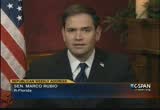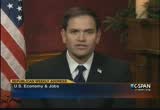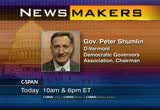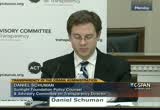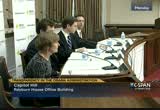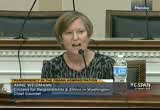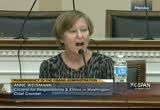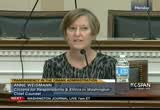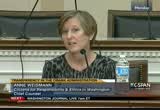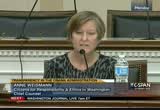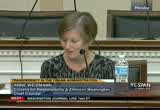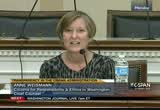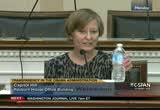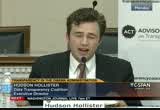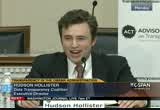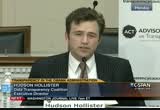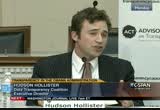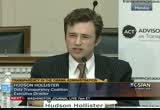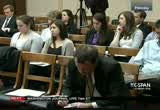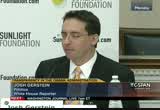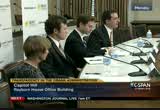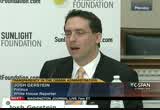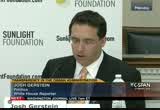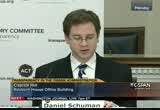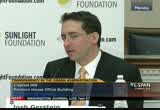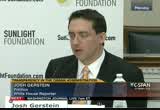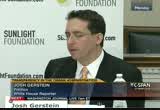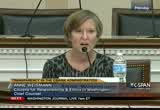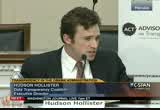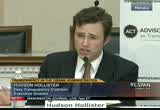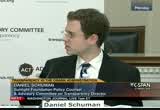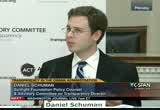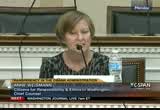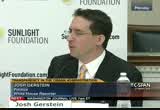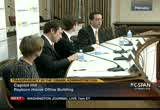tv News Politics and Public Affairs CSPAN December 9, 2012 3:40am-6:00am EST
5:00 am
not only will that campaign have saved tens of thousands of lives, it can save millions of dollars. an ounce of prevention can have a pound of cure the impact. that is the case with tobacco control. exports, it is the question of doing it and the employment things proven to work. one is hard hit in campaigns.
5:01 am
what we did was pull back the curtain. we have taking care of it far too many patience who have had heart attacks. smoking does not to cause cancer. it defects every part of your body. we are taking care of who sixth brought to their families too early. we showed what it was like for people, very courageous americans who live with this problem. people quit until the 10's of thousands. we plan to run another and an arab state and with that can and it is like. guest: i totally agree. if you were to pick out one among any, smoking is scholarly
5:02 am
in my mind and others the most important when you think of the impact on that smoking on some of any organ systems. not only be cancers, not only cardiovascular disease, but long disease of the to general. we have been talking about the food for some time. people who are smokers have a propensity to get the kind of a man known as you have. host: another topic that what you to address, secretary clinton talked about where we are as far as research and implementation. she said an aids free generation is not just their rallying cry, it is illegal within our reach. what does that mean for your organization? guest: secretary clinton has
5:03 am
been a leader at the end of the concept. she introduced the concept of an aids for a generation. right now 31 years into the pandemic, we have the tools based on clinical research, prevention tools, diagnostic tools, and treatment tools to turnaround the trajectory. we are already starting to see that. it is a matter of implementing these things. striking is the difference between 30 years ago and not only will we do now. when you treat somebody its of the effected and the brand on the level of the virus, you dramatically diminished the likelihood that person will infect their unaffected sexual partner. we are starting to see not only treatment for the patient but as a form of prevention.
5:04 am
it brings the virus down to such a low level that does not get transmitted to your sexual partner. then and there are pure prevention modalities. needle exchange, prevention of a mother-child, right now and then to a 2012 low we just had with world's aids a date with the ceremony and the state department, it it was emphasized we have within our grasp the tools both domestically as will other globally the models that you create indicating you can diminish the trajectory of the pandemic to the point to where you can realistically start talking about an aids free generation. that is the terminology secretary clinton used. it has balkanized as to push further.
5:05 am
host: the centers for disease control works for this country and around the world in hiv. our focus as the testing and reduced risk. each can have a big impact. more and more americans are letting their status as a knowledge is power. if you are on treatment you will live long year and will be less likely to infect partners, in fact yourself, and your community. you can reduced risk behavior. we are concerned about younger men who have sex with men who we have seen an increase by hiv infections. we hope we will be able to turn that around it. globally there has been a sea change and countries around the world, hiv was a death sentence even after medications or available.
5:06 am
with what is called the president emergency program for aids relief, will have been able to scare up treatment a denture a way that is inspiring. there are more than 4.5 million people who are on anti and factories to comment. if it or not, there were be dead or dying. last year alone more than 200,000 babies were born without a chevy that would have been hiv infected. i will tell you, i will never forget a woman i met a in nigeria who was holding twins. she said, my points are hiv negative because of the american people. please go back and thank them for me. the promise of an aids free generation is not an empty
5:07 am
promise, it is possible. we provide half of all of the treatment and the transmission prevention. what we have been able to do is to drive down costs dramatically from over $1,000 a year to a few hundred dollars a year, and we are continuing to see those fall and to help countries step up. help countries shoulder more of the burden of treatment and financing of age of the prevention and treatment so we are seeing the hope of driving numbers down. if you look of the country's adult forever could have done the most, the number of new infections has fallen quite substantially by 25% or 50% of in many of those countries.
5:08 am
after learning there may be content, we have lined treatment is prevention and scaling saves lives and it can stop the epidemic if we do it effectively. host: we have a few more minutes with our guest. caller: how is everybody this morning? my grandfather, i was going to help home and entered the summer time. he would say, make sure you watch the apples or what ever you are producing. make sure you are question them. how dangerous are pesticides even though they're killing the bugs -- how detrimental are they to our help -- our health to
5:09 am
wash them before we eat them? the second part is preservatives. how healthy are preservative's for us? the next question would be water. is a to causes enough? as drinking water underrated? to receive more benefits from people pose a health from drinking more water? guest: pesticides are important to the agriculture industry. common sense is if you have a pesticide you should wash it. it is something you should do. i think if you in just -- a small pesticide would not cause you harm. clearly, you should wash the food that comes from the ground or the trees. preservatives are important
5:10 am
because you can get the greater problem of contamination if you did not have them. clean up water, if you want clean water. the water is safe to enter this country. there are chemicals there are and there. it the idea of chlorine in of the water is regulated so i feel we can be comfortable. not so in of the countries where clean water is one of the problems they have the. >> anything to add it? cox it is not clear how much you need. the real question as water as opposed to what? water is refreshen, it is a 0 calories and free. we encourage people to make
5:11 am
chilled water available for people. that is important. we end up drinking a lot of calories. there is some evidence that if you drink calories you do not recognize you have to absorb them. a goes back to the roots of public health. clean water is something that is not widely available as it should be outside of the united states. local governments and state governments have a critical role to play making sure the water system stays safe. >> how are you doing? the doctors -- i have all the respect for the doctors. they went to school so long i cannot believe them. i am 65. about 1950 to adopt the mobs and they went to my brain. i think the doctors ought to
5:12 am
have on that a little bit and let people know what can happen to their children if they are not vaccinated against mobs. guest: the caller makes a good point. these childhood diseases where you hardly ever see them anymore, they are still serious diseases. moms contribute complications that underscores the fundamental thing that we have been talking about it. not only for influenza, but for the childhood diseases. it is the reason why we continue to have recommended vaccinations to avoid the complications the caller mentioned it. host: we have talked about a lot this morning. aside from what we have talked about, what is the other thing
5:13 am
you are concerned about when it comes to america oppose the health. guest: we need to keep our guard up. keeping the public health system strong and vibrant at the federal level and state and local levels. we've been not know what the next outbreak will be, but we know there will be another outbreak. we have to be ready for emergencies and ready to respond effectively and quickly. that means keeping our laboratories, our public of the institutions on the ready. not only addressing today's problems but getting ready for tomorrow. we run the risk of success. the last caller made a great.
5:14 am
about mops. so many people have grown up not sitting the killer childhood diseases they may not fully appreciate how important it is to get vaccinated. we need to make sure we have a robust health system ready to detect and respond as quickly to protect from threats 24-7. >> to get the tools to complement the things the doctor just said. >> he is the director. also joined by the center for disdains control. to roy very much. -- disease control. thank you very much. >> they discussed the latest on the fiscal clef negotiations and
5:15 am
preview the week ahead. a look at the role of lobbyists. an update on the situation from syria. president obama talks about tax policy. there were put employers by the previous >> project administration and will expire at the end of the year. then marker rubio gives the address. >> hello, everybody. over the last few weeks, there's been a lot of talk about deadlines we're facing on jobs and taxes and investments. but with so much noise and so many opinions flying around, it can be easy to lose sight of what this debate is really about. it's not about which political
5:16 am
party comes out on top, or who wins or loses in washington. it's about making smart decisions that will have a real impact on your lives and the lives of americans all across the country. right now, middle-class tax cuts are set to expire at the end of the year. time is running out. and there are two things that can happen. first, if congress does nothing, every family in america will see their income taxes automatically go up on january 1st. a typical middle-class family of four would get a $2,200 tax hike. that would be bad for families, it would be bad for businesses, and it would drag down our entire economy. now, congress can avoid all this by passing a law that prevents a tax hike on the first $250,000 of everybody's income. that means 98% of americans and 97% of small businesses wouldn't see their income taxes go up by a single dime. even the wealthiest americans would get a tax cut on the first $250,000 of their income. and families everywhere would
5:17 am
enjoy some peace of mind. the senate has already done their part. now we're just waiting for republicans in the house to do the same thing. but so far, they've put forward an unbalanced plan that actually lowers rates for the wealthiest americans. if we want to protect the middle class, then the math just doesn't work. we can and should do more than just extend middle class tax cuts. i stand ready to work with republicans on a plan that spurs economic growth, creates jobs and reduces our deficit -- a plan that gives both sides some of what they want. i'm willing to find ways to bring down the cost of health care without hurting seniors and other americans who depend on it. and i'm willing to make more entitlement spending cuts on top of the $1 trillion dollars in cuts i signed into law last year. but if we're serious about reducing our deficit while still investing in things like education and research that are important to growing our economy -- and if we're serious about protecting middle-class
5:18 am
families -- then we're also going to have to ask the wealthiest americans to pay higher tax rates. that's one principle i won't compromise on. after all, this was a central question in the election. a clear majority of americans -- democrats, republicans and independents -- agreed with a balanced approach that asks something from everyone, but a little more from those who can most afford it. it's the only way to put our economy on a sustainable path without asking even more from the middle class. and it's the only kind of plan i'm willing to sign. everyone agrees we need to bring down our deficit and strengthen our economy for the long-term. the question is whether we can do it in a responsible way that allows us to keep investing in the things that have always made america strong. i'm convinced we can. and if both sides are willing to compromise, i believe we can give businesses and families a sense of security going into the new year. thanks, and have a great weekend. >> hello, i'm marco rubio. i have the honor of representing florida in the united states
5:19 am
senate, and the privilege of addressing you today on behalf of my fellow republicans. our middle class has made america different from the rest of the world. every country has rich people. but only a few places have achieved a vibrant and stable middle class. and none has been more vibrant and more stable than ours. but now a growing opportunity gap has developed between the dreams of millions of americans and the opportunities for them to actually realize them. americans are struggling to find or keep middle class jobs for two reasons -- because our economy is not creating enough of these jobs and because too many of our people don't have the education or skills required for the jobs that are being created. a limited government can and must help solve these challenges. we must get the national debt under control. tax increases will not solve our $16 trillion debt. only economic growth and a reform of entitlement programs will help control the debt. we must reform our complicated, uncertain, job-killing tax code, by getting rid of unjustified loopholes. but our goal should be to generate new revenue by
5:20 am
creating new taxpayers, not new taxes. we must follow a balanced approach to regulations. regulations are needed, but they cost money to follow. the more expensive a regulation is, the less money a business has leftover to give raises or hire new people. we must not let american innovation in our energy industry go to waste. we have the potential for all kinds of new middle class jobs- from the fields and platforms where we drill, to the manufacturing plants that will return to the u.s. with the lower cost of energy. but we need government to encourage these job opportunities, not continue to block them. a return to sound monetary policy would also help by making the future value of a dollar more predictable. and we must get the cost of health insurance under control.
5:21 am
you should be able to get a health care plan that fits your needs and your budget, from any company in america that's willing to sell it to you, and with the same tax benefit if you buy it yourself or have an employer buy it for you. these ideas will help create middle class jobs. but we also have to make sure that our people have the skills to do these new jobs. and a limited government can help by promoting curriculum reform, teacher training and empowering parents with the freedom to choose their kids' school. our tax code should reward education investments the same way companies are encouraged to invest in equipment. let's encourage career, technical and vocational education, stop discriminating against online courses, encourage skill development that doesn't require the traditional four-year college route, and reform our federal grant and loan programs. and let's make sure our students and parents know what they're getting into financially when it comes to planning their college studies. the bottom line is, let's stop preparing 21st century students using a 20th century education
5:22 am
model, instead let's be creative, innovative and daring in reforming the way we provide our people the skills they're going to need to make it to the middle class. and finally, we must realize that our social well-being has a direct impact on our economic well-being. societal breakdown can't be solved by government, but it also can't be ignored by government. helping people make it into the middle class is a personal issue for me. my parents worked in the service industry. in almost any other nation on earth, their jobs would barely provide for daily living much less a better future. but in america, my parents made it to the middle class. today, the journey my parents made from poor immigrants to middle class, it's harder than it was in their time because the world has changed. the economy has changed. but whether or not the journey my parents made is still possible to all who are willing to work for it, well that will decide whether america will decline or whether america will remain exceptional. the emergence of a strong, 21st century american middle class is the answer to our most pressing challenges. and it all starts with our people. in our hotel kitchens, in the landscaping crews working in our neighborhoods, and in the late night janitorial shifts that clean our offices.
5:23 am
there. there you will find the dreams america was built on. there you will find the promise of tomorrow. their journey is also our nation's destiny. and if they can give their children what our parents gave us, well then life in 21st century america can be better than it has ever been. may god bless all of you. and may god bless the united states of america. >> an evaluation of the transparency of the obama administration. your calls, commons on washington journal at 7:00 a.m.. on the news makers, the new
5:24 am
chairman of the democratic association talks about peace did issues including employment and the affordable care act and the fiscal cliff and plans for the 2013 and 2014 elections. "to newsmakers security is live at 10:00 a.m. and will show again at 6:00 eastern. >> we are at the new york state museum. this is the corollary dedicated to the september attacks of the world trade center. we have decided to tell the story from the first moments of the attacks using objects and photographs from the world trade center. this piece of steel, we put it
5:25 am
in a place where the public can come and talk -- touch bit. this is a piece of steel from the north towers. this is a dramatic piece of steel. you can see the openings where the window would have been. every piece of steel as marked so you know which building, which for, and which side it was on. we picked this one because it was so close to the impact and had the numbers. 71-74. it also has the number stamp
5:26 am
inside the steel. >>. "book tv security as we look -- book tv," as we look -- >> whether president obama is living up to his pledge to have the most open government in history. this is a 90 minutes. >> good morning. welcome to the advisory committee on transparency and the obama presidency. the there are a many meanings of transparency. i will not get into all of them today. they are wildly diverging opinions on the successes of the obama administration.
5:27 am
president obama made a number of promises when he was running for president. a number are still available. new issues came up from dealing with campaign finance disclosure to dealing with lawsuits and other incidents. what i hope we will be able to talk about today is what has occurred or not occur during the last four years and looking for to what will happen. i am joined by three experts. i have on my right the executive director of the transparency coalition. to my left is joshed who is the white house reporter for political. i will go right into remarks from the candidates. we will start with them. >> i will give some general
5:28 am
remarks tension on ethics and transparency issues. if i had to summarize how the obama administration has done, i would say efforts have been well attended but not always well as its -- executed. i think they started out wanting to make a strong statement. one of the initial efforts to have was the lobbying plan and they put into place. said two years and after leaving, you could not lobby on the agency you left. one concern i have is i think it flows from the basic premise that lobbying is evil. i think lobbying allows a lot of voices to be heard, voices that would otherwise not be heard this big on the public interest.
5:29 am
beyond that, i think it is under inclusive and over inclusive it. it was based on whether or not you are a registered lobbyist. it swept and a lot of public interest groups. these groups do not lobby for money. and are lobbying on their expertise on behalf of the public interest. they are people that i think we should want a in government because of their interest and because there are looking out for the public interest. it is under inclusive because if you were not a registered lobbyist, you are not registered to it. finally, i would say it has the perverse effect of causing people to be registered. that is an event that triggers the lobbying ban. obviously, it degenerative of
5:30 am
controversy. i think the white house was trying to signal, we mean business. i questioned its effectiveness and it could have been more nuanced. in a similar vein, the white house early on made a decision to disclose -- it again, i think there were trying to make a bold statement. i think it had mixed success. i always want to point out, they did not do this on their own. they did it on the face of litigation by my group care they were in the middle of negotiation over obamacare. we wanted to know which lobbyists had visited the white house. having to argue for not disclosing that an for mission would have been politically embarrassing for them. with that said, they did adopt
5:31 am
the policy that put the records online. i think you can read a lot more of news articles. at the same time, we have had more suggestions they are less than complete. everybody was focused on paula broad well and her affair with david at pretorius. my understanding as some of the times are not recorded at the interlock. that suggests there are doubts and in the record. we have stories about white house staffers. i do not mean to sound totally negative. what to say is to start out as bold gestures, the devil is somewhat in the details and they do not always work out to be a positive thing. we have some other things. we have the wonderful memos that
5:32 am
came from the president and the attorney general. i think everybody in the access community was thrilled to see this was going to be a high priority for the administration. i think you cannot talk about ethics of up talking about transparency because it is the light of public scrutiny and that keeps people ethical. i think the has been quiet mixed. it is hard to change cultures and agencies. there has been a culture of secrecy. i think we're starting to see change, but it has been slow. from my perspective, the biggest offender has been the department of justice. a lot of significant documents
5:33 am
and litigation, we are seeing it is the same position at always as paris or started out as a big, bold initiative, implementation has been mixed. the big question that i have is how often are discretionary closure is being made? there is no way i can quantify that fact. we have had the open government directive, which i think has been a very positive step. the white house is saying to all the agencies, this is something you need to embrace. you need to start making per active disclosure data. it has been slow. on the legislative front, we have not seen a whole lot. we did see the disclose act passed.
5:34 am
-- the resource are, the disclose acted did i get past. the stock act, i think it was undercut to some extent. one of the provisions of the thought was important would have barred members from getting pensions if they were convicted of felonies. it was taken out. i think what legislation has come through has been watered down. we have not seen that many if any initiatives from the white house. we have seen nothing -- i would argue there is lots of room for improving the statute. i think the best evidence of that is that every four years when a new attorney general comes in, there are able to defect enormous change. the statute says disclosure.
5:35 am
the has been what it has gone too. let me close with the fact that i do not realize -- it is not my intention to come across as negative. i come from a mean for prospective -- perfection. i think it is the job like groups like mine to be badgering the administration to be doing a better job. i think there has been some important changes. i think the fact we are having more and more dialogue about transparency and ethics is an important step. there is a long way to go. in the next four years, we will get a sense of how community administration is to the goals announced of the beginning of the administration. i will turn it over to the next
5:36 am
person. >> thank you. i am the director of the data transparency coalition which is the only trade coalition of for- profit companies focusing on what the government does with its own data. we have 11 tech companies as members. broadly speaking, the coalition supports policy that will result in the standardization of public data. policies that align well with the open government directive as a strategy. the stated direction of the obama administration. a denture our opinion, government data bus be published and must be published
5:37 am
in a useful format. it must be standardized and it readable. up until now -- does somebody have a phone? up until now we have not done a good job of the publication. what our view is of what the obama administration has accomplished, has it made strides toward publishing market did the government? absolutely. has the administration published the most government data? then zero. the information that agencies rely on, that is not being published. our coalition usually thinks of government data in five categories. i think we spend a lot of time categorizing and studying beautiful policy.
5:38 am
i will not spend too much time on this. we have five buckets we usually talk about spending, management to performance, legislation, and judicial documents. in each case there is data that is at the core of government. the meat of what we are talking about. the questions that need to be answered are how much the government spending, what is the spending on grants, what is being spent internally, how does it compare with the transactions i reported to the treasury department? as many of you know, landmark legislation, the digital accountability act was proposed a denture june of 2011. it was both sides of the held by both parties. to be blunt, the obama white
5:39 am
house has opposed the day to act. the administration has testified against legislation. they have tried to prevent congress from passing legislation that would require the spending intermission. let's talk about the management category. that second category. the most important data in this second category is what programs does the government have? how does their performance compared to past performance? there has been more progress. congress passed the modernization act. it requires the administration to come up with a consistent list of two programs. as far as we know that is happening. it will allow us to track
5:40 am
performance, that is great. regulation. this is a category where progress by the administration has been mixed. we have half a million datasets, many are machine readable. the most important regulatory ever mission is not being published, and the administration has not moved towards getting it published. let's take financial regulatory information. the securities and exchange commission requires companies to provide information. that means they are machine readable but the sec has not moved to take any of the other information that they require and put it into a machine readable format. 600 different forms and mission types. although the tagging as great, it only applies to two out of 600 forms. the administration has not taken
5:41 am
steps to adopt more tagging such as -- those are probably the most important categories on judicial documents later on. one suggestion for why this has not happened. publishing the most important data is very hard. requires a lot of people to change their jobs and requires action as we are seeing with the data act. the administration has been reluctant to pursue. translate those into real action and exercise the bully pulpit of the presidency to make sure action happens. >> thank you. josh. >> i thought i would try to give a reporter's perspective on the
5:42 am
issues related to transparency. for me the rubber meets the road, i would like to be getting more information where a think the administration has discretion to do more than it is currently doing. then we can discuss why it is falling short. i think the first one is pretty topical, which is the fiscal clift discussions going on. you have meetings taking place at the white house with stakeholders, small-business leaders, what is your call liberal interest groups and others. they have taken place behind closed doors. they would allow us and to see them. even when members of congress came to see them, they shut out before any discussion to place. who would think it should be any different? you can go back and look and
5:43 am
find out one person who seemed to think things like this would be different is a guide by the name of barack obama when he went back to his 2008 campaign and you looked at what he said as the health care reform talks and legislation came to fruition at the beginning of 2010, he said he made a significant mistake by abandoning transparency. too much was done behind closed doors. going forward, he would do things differently. it seems we are not doing things differently than was done in connection with health care. i do not know whether his promises were realistic or unrealistic, but it does seem like we are short of what he promised. one other story and have been covering as the court martial proceedings for bradley manning who is accused of being a source for wikileaks.
5:44 am
you can go up there and see what happens at enter the courtroom. beyond that, there is no transparency whatsoever you can i get documents related to the case. i am not only talking about the evidence but the legal filings, the defense motions, the judge's rulings. she reads rapid-fire from the bench. good luck to you if you cannot job it all down. you will not be getting it anytime soon. it is a bizarre way of proceeding if you are familiar with federal or state court. who would think that kind of proceeding, maybe things can be done differently? in another context, similar to what and was sitting with a
5:45 am
political comparative to push the process forward, they made a concession and said in does proceedings modeled on court- martials, they would make findings public within a short period of time. they paid a fair amount of money. the post the filings with a reasonable amount of time. there is a transcript within 24 hours. these things are not complement -- these things are not complicated. they were able to do that after some deliberation with respect to many military proceedings under way, with respect to a more procedural court-martial hearing. they find themselves paralyzed and unable to provide any transparency. those are a couple of examples of my disappointment scenarios
5:46 am
or the administration could have done more. we have seen interesting efforts by the administration to discuss things by drums and the legal principles behind it. there has been a resistance to discuss the nitty gritty. they will come out and say what they think we should know and it amounts to a few sentences of the principles and to the extent you want to flush it out more than that, it will get the permission they leak to the washington post when they see it again to their interest. as always a little bit disappointed -- disappointing. there are my thoughts as a reporter right off the bat. >> thank you very much. this will give us food for thought.
5:47 am
unfortunately, nobody was able to attend. there are critiques that we have that might be useful for a moment -- maybe for a moment to channel the white house and if they were here. what would you say they have done a good job on? we all have criticism. there are some things like the open government initiative and parts of the partnership, efforts around the first creation of the chief of permission officer. there are things that have gone well. it might be worth touching on that a little bit before we turn around and have at it. do you want to start with things you have done better? >> short. my impression in two areas.
5:48 am
i think the advance is pretty substantial. it seems to me a lot of these areas, the way we will make progress toward more press -- transparency is to try to institutionalize a process. and is left to ends individuals, i have drawn pessimistic over the years that it will make any kind of progress. it seems to go against human nature. i think it will be hard for the next a ministration whether it be republican or democrat to reverse the obama administration's position on the visitor lot. that is something that is useful to reporters. is it perfect? know. are there ways to get a round it? yes. are there ways to get the news out? yes, but sometimes you can use the fact it will come up to get the white house to discuss these
5:49 am
things to you. i think that is a substantial contribution and i do not want to diminish it. i would like to know more about what they admit from the logs. i think it is over two million visits. i think they may have a different perspective. i think of them to the freedom of administration act, in some areas and at some times they have interpreted it to release more information than they're predecessor administration or administrations could have. i have seen them do that again to some instances. is not substantially different. they do seem to to be a difficult position and to accord to their predecessors. there has been more of your mission forthcoming to the process. i think it falls short of what
5:50 am
open government advocates have expected. >> by a group with a lot of what joshed said. as i said before, the willingness to tackle what are hard issues is to be commended. if i compare us to the previous administration, which i think was the most secretive in modern times, there is no comparison. i think the open government directive is another thing, they are trying to institutionalize things. i have come to appreciate how difficult and challenging that is. when you are dealing with all of the agencies and the cultures that have existed for a time -- the average person processing aid request as well, i will now
5:51 am
get in trouble for what i did not disclose, it is what a to disclose the will give me into trouble. it is hard to side with that. i give them a lot of credit for trying. i did not mean to suggest it has been a total failure. we have had some reasonably successes. as long as they remain committed to the issues, we continue to have time to further entrench some ideas of greater transparency. >> in the open data areas, there has been progress. i point to the work of taught parks who made a name for himself of the department of health and human services by hosting what he called hack a thons. the would invite developers to build apps and visualizations of
5:52 am
business opportunities. he has continued that practice, the treasury hosted the first event focused on finance data on friday. the treasury require the administration to change it from a hackathon to a conveining. it is much less threatening. those events are allowing the them to identify where the gaps are. what is valuable data? you can discuss a value of interest couple of different was, primarily to come talk about whether data is valuable to a democracy or a volley will bolt to the companies such as
5:53 am
the members of my coalition that wants to use of for more business opportunities. my basic criticism is all but the highest datasets for democracy and business opportunities are still not disclosed or standardized. although the incremental process without a legislative agenda, i think the white house cannot get there. >> this leads us into the puzzle parts of the program. we were talking about institutional a station. we have seen efforts along the way. the open government initiative -- there is no legislation to basically translate into something permanent. this is an effort to cut the agency is moving ahead and try the same direction. we saw the leadership saying, it
5:54 am
was not the agency's senior folks, it was the man that folks. we had at one point an ethics bar. with respect to this, it seems like there was a chance that happens when he went to become ambassador to the czech republic. our executive director said he did not have transparency, which was not helpful for our relationship of the white house at the time. there are different pieces of institutional as vision. there are questions around getting agencies to do things. what is impeding progress from where i sit, transparency is one
5:55 am
of the issues that people can agree on. they do not agree on everything, but they agree on a lot of things. what is holding up progress here? >> i think you have alluded to some of them. without a point person and to the white house that has access to the president, it has been a tough slog it. i think having somebody who really was commited to the issues who was willing to take on hard issues really did make a difference. norm was the champion of releasing the white house visitor log. i think he was a person willing to look at a visionary sense. to look for ways to institutionalize a change because there would not be in power forever. that has made a difference.
5:56 am
that lead has not been picked up anywhere else. i think it would be a logical place for there to be a point person who could really institute change. that did not happen. i think it is wonderful that there are chief officers. i do not know whether that has really led to any greater government wide initiatives and changes. i think the lack of effective leadership in the white house until the executive branch has made it difficult to make more significant progress. >> i think it is tempting to say the white house could not wrestle the agencies to do what they wanted the agencies to do. while part of the problem, that
5:57 am
does not give a full explanation. i can say that from my perspective, their compliance with federal open government laws, the have to comply with directly the federal advisory committee act is spotty. even when it it is not spoted, there are many areas of ambiguity. it tends to take the most aggressive bush-type position that they do not have to open subcommittee hearings or telephone meetings are what have you. a story about how the president opposes jobs council had not met him a debt to six months, which is now 11 months. that was true because if you look, there has bidault official meeting. they have been meeting by telephone on a monthly basis and been getting briefings from a fairly significant -- the
5:58 am
treasury secretary or things along the lines. i feel like and an administration committed to transparency would figure out a way to do the things in public as some in the school committee's of around the country managed to do. for this white house, people seem to view it as an inconvenience and annoyance that are not offering that level of transparency. i think it is both the difficulty of rest and agencies to the ground and some sort of lack of commitment at the top to the ideals of transparency, particularly when there is a downside. i think one of your colleagues said a few months ago that as soon as you collide with something that has political downside, transparency goes by the wayside. that is essentially what i think has happened until many instances predicting carry the day when a it is something the mainstream press is not
5:59 am
interested in. the moment a gets into the spotlight, the ball loose lips far down on the scale of what the white house is interested in. >> the administration has made commitments. the have reconfirmed the office of regulatory -- they are to disclose these things, they have a memo that directs this behavior as well. they're not doing it. is there no person sitting you need to do these things? is there is lack of political will? the second question is, press secretaries have a dual position. one is to the -- to be the spokesperson for the administration. the other is to help give answers to questions. ar
78 Views
IN COLLECTIONS
CSPAN Television Archive
Television Archive  Television Archive News Search Service
Television Archive News Search Service 
Uploaded by TV Archive on

 Live Music Archive
Live Music Archive Librivox Free Audio
Librivox Free Audio Metropolitan Museum
Metropolitan Museum Cleveland Museum of Art
Cleveland Museum of Art Internet Arcade
Internet Arcade Console Living Room
Console Living Room Books to Borrow
Books to Borrow Open Library
Open Library TV News
TV News Understanding 9/11
Understanding 9/11